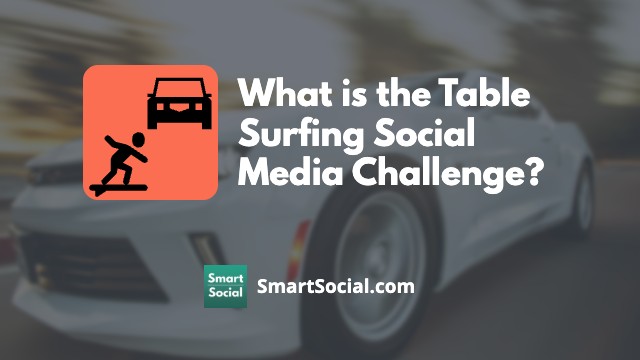8 Social Media Safety Talking Points for Parents
Green Zone App
(Click here to learn more)
Dangerous Social media challenge
(Click here to learn more)
Red Zone App
(Click here to learn more)
Gray Zone App
(Click here to learn more)

When it comes to keeping kids safe online, no tactic or monitoring app is better than having a healthy and open dialog with students about social media safety. It can be difficult for students to open up about their online life, but as parents it’s important that we encourage discussion from an early age. With social media moving so fast, parents can sometimes struggle to keep up in the conversation. So, we asked 8 experts to share their best talking points, resources, and strategies parents can use to have a healthy dialog with their children.
1. Ask questions and use yourself as an example

Andrea Corrales, Arc
When it comes to digital safety, lecturing your student or child will immediately shut them down, especially if you're talking to older and more tech-savvy teens. View teachable moments as a way to ask questions and have a conversation. You can do this by using yourself as an example and speaking in “I” statements instead of telling them directly what they should or shouldn’t do. For example:
- Bad: “You shouldn’t post negative things about other people online.”
- Better: “I think it’s important to remember how negativity affects people online.” Or “How would you feel if someone posted something negative about you online?”
2. Become involved online and offline

John DeGarmo, Ed.D., The Foster Care Institute
Here are some tips parents should follow when protecting their child from online dangers and using digital safety:
- Become involved in your child’s life, interests, and activities – both online and offline.
- Be persistent in warning your children about dangerous and inappropriate sites.
- Protective filters and browsers should be in place, helping to block your child from accessing these sites.
- Set up clear guidelines for all online use with the child, and post these near a computer as a consistent reminder.
- Closely monitor your children’s online actions, as well as their cell phones for any disturbing messages, texts, and pictures. Let them know you will be doing so.
- Teach your child not to believe everything that comes across the computer screen or online device.
- Teach your child to bring to your attention any site or contact that might be suspicious in nature.
- Ensure that you have access to your children’s online activities, so you can monitor their actions on the internet.
- Keep credit card details somewhere safe where children can’t access them, and avoid saving credit card details online. Make sure ‘click to buy’ options are not activated.
- Teach your child about the realities and dangers of child predators who prowl the internet.
3. Help students create a healthy digital footprint
Julia Cook, Author

Technology is a beautiful thing, but we must teach our children to manage it wisely, so that it can benefit their lives. Here are a few tips for guiding children towards a productive and healthy digital footprint:
- Spend time with your children by navigating the internet with them. This can help promote a better understanding and respect for technology.
- Monitor online access. Place your household computer in a central location and limit unsupervised online access. Kids who have unlimited access online behind closed doors can get into trouble because technology doesn’t play fair.
- Get in the habit of having all devices (video games, tablets, computers, phones) charge overnight in the master bedroom so that they can’t keep your children awake at night. If your child uses his/her phone for an alarm clock, replace it with an inexpensive digital alarm clock.
- Never post personal information, such as your address, passwords, bank account numbers, or home phone number, online or on your social networking sites.
- Warn your children not to meet in person with someone that they first met on the internet. If someone asks to meet with them, they should tell a parent or guardian.
4. Teach password safety

Nick Santora, Curricula
The average person has over 30 online accounts. It's important for students to understand that they need to differentiate passwords between these accounts to keep them secure. If one of your student’s online accounts is compromised, a hacker can use that same password to access their other accounts. Students can build secure passwords using the passphrase system. Challenge them to think of their favorite book, movie, or quote, and grab the first letter of each word in the title. Then, use a number that isn’t their birthdate, along with a special character. Using this method will help students remember their passwords and protect their online accounts.
5. Practice online “stranger danger”

Coral Paige, Custom Computer Specialists
Just as we have “stranger danger” in life, we should also practice online “stranger danger.” Students should never give out their personal information, such as address, name, phone numbers, school name, passwords or selfies online, even to those they consider “online friends.” The internet and social media should not be used to spread gossip or bully anyone. Most schools make security tools and software available for students to protect themselves, their personal information, and their computer/device from viruses, spyware, spam, ransomware, and other malware. Students need to understand how to use these tools and why they’re important. Students guide their own online experiences and should treat the internet like they do the real world. If something online makes them uncomfortable, they don’t have to respond. They can exit the page or tell a teacher or parent.
- Students should never, under any circumstances meet in person with someone they met online.
- Students should change their passwords regularly, never share them with anybody, and avoid using a password that might be easy to figure out.
- Free media can make your computer and its network vulnerable to a host of malware and viruses. Students should not download anything they are not sure of.
- Students should refrain from storing credit card or bank account information online.
- Warn students about oversharing personal information on social media. Vacation pictures just broadcast to thieves that their house is empty!
- If you post a picture of your car, blur the license plate. Someone with access to the right tools can use the license plate number to find where you live, your name, and other personal information that strangers shouldn’t have.
- Impress upon students that when entering login information on any website, ensure the website is preceded by “HTTPS.” HTTPS encryption scrambles your login information and helps prevent identity theft.
6. Remind teens that it's impossible to know if people online are who they say they are

Mike File, File Academy Online Learning Center
The biggest tip I feel young people need to know is that it's impossible to know whether the person you are chatting with online is actually who they say they are. (Someone who claims to be a 16-year-old girl can easily be a male predator or trafficker.) Never make plans to meet someone you meet online by yourself.
7. Only make friends online with people you know in real life

Vasiliki Baskos, Learn Greek Online
Only make friends online with people you know in real life. Do not meet anybody in real life that you met online. Before you post anything, think, "what will happen if my worst enemy gets this info?" After you post the information will stay online forever and it may not be safe. Last but not least, use a different password for each service.
8. Try blended learning

Jessica Parnell, Bridgeway Academy
Students engrossed with their in-hand technologies are prime targets for education, yet education systems focus on keeping pace with them. Unfortunately with this expanding territory of online learning, comes the dangers of misinformation, predators, and privacy invasion. A new widely researched strategy that further prevents these risks is a trusted blended learning approach, much like Bridgeway's Elementary Blended Learning Program. Blended Learning sets helpful guardrails for students that use technology by incorporating traditional resources, such as books and hands-on materials, while simultaneously empowering students to utilize online tools within a safe space.
Conclusion
You are the best safety resource for your family, and having regular discussions about social media safety is the best way to ensure your family is protected online. If you ask your children questions, monitor their online behavior, teach them password safety, discuss online stranger danger, and set clear guidelines, you encourage them to become proactive with their social media safety. When having these discussions with your children, be mindful of their mood, the environment, and your tone. Focus on being supportive and letting your children know that they can always come to you if they experience anything that makes them feel uncomfortable online. Following the steps above can help keep your family safe on social media and online.
Protect your family and enter for a chance to win cool prizes
Become a member or log in to learn more on this topic
Protect your family and enter for a chance to win cool prizes

., start learning from this page to earn points!*
Hello, I'm Josh, the founder of SmartSocial.com.
Don't leave this page until you fill out our feedback form that will appear after you learn from the resources...
Here are some of the latest resources at SmartSocial.com
Become a Very Informed Parent (VIP) to get our social media suggestions in your email every Tuesday & Thursday.



Hello, I'm Josh, the founder of SmartSocial.com. Protect your family by taking my 1 minute quiz
This quiz will help you understand how safe your family is


Schools & Districts: Partner with us to protect your community online
Our remote presentations (and website) teach over a million parents and students each year how to be safe so they can shine online. We teach students how their accounts can be used to create a portfolio of positive accomplishments that impress colleges and employers.


Join Our Smart Social Podcast
each week on iTunes
With over 500 episodes, Josh Ochs interviews psychologists, therapists, counselors, teachers, and parents while showing you how to navigate social media to someday shine online.
Listen on:



.jpg)
.jpg)
.jpg)


